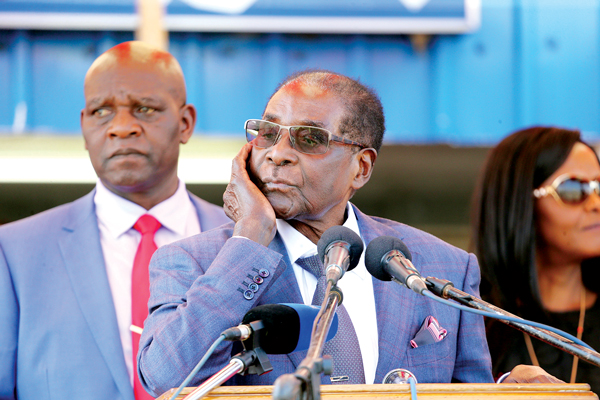
WHEN former war veterans leader Jabulani Sibanda in 2014 refused to attend a rally that was to be addressed by then First Lady Grace Mugabe, arguing there had been a “bedroom coup” at State House, he was arrested and charged with undermining former President Robert Mugabe’s authority.
BY RICHARD CHIDZA
The case is still pending in the courts, but like all others in which political activists across the divide had been charged, it is likely to fall by the wayside after Mugabe was swept out of power by a military tide that rolled into town in November last year.
History is replete with attempts by politicians to establish dynasties, with some having succeeded somewhat, but most have fallen flat after such bids were rejected by citizens.
Legendary Chinese dictator Mao Zedong tried to support his wife Jiang Qing’s bid to take charge of the Communist Party as age and ill-health took its toll, but failed.
“Jiang’s most important qualification in exercising power was that she was Mao’s wife,” historian Wang Ke-wen said.
Mugabe, an avowed Mao disciple, also unsuccessfully tried to prop-up his wife Grace’s political fortunes, but faced resistance from mainly the country’s military.
Mugabe tried everything in his power, but in the end, the army stormed his residence and placed him under house arrest under the pretext of protecting him while targeting “criminals around the President”.
- Chamisa under fire over US$120K donation
- Mavhunga puts DeMbare into Chibuku quarterfinals
- Pension funds bet on Cabora Bassa oilfields
- Councils defy govt fire tender directive
Keep Reading
Effectively, Mugabe was forced out of power in one of the most complicated coups of modern times.
Sibanda’s successor at the Zimbabwe National Liberation War Veterans’ Association, Christopher Mutsvangwa, said of Grace’s bid for high office: “She (Grace) just used a marriage certificate to get her cohorts at State House to start running this government. I saw it in Cabinet . . .”
Mutsvangwa was sacked as Cabinet minister in 2016 and engaged in public spats with Grace’s acolytes Jonathan Moyo (then Higher Education), Saviour Kasukuwere (former Local Government and Zanu PF national commissar), and Mugabe’s nephew Patrick Zhuwao, initially Indigenisation minister and later Public Service).
Grace also reportedly used her new-found power to get a questionable PhD degree from the University of Zimbabwe that has been the subject of protests by students from the country’s prime higher education institution, as she prepared herself to succeed her husband.
Analysts argue Mugabe’s wish to have his wife succeed him was inspired by an immortal fear of how his successor would treat him and his wife given his alleged well-documented history of human rights abuses and abating corruption.
Mugabe ran aground one of Africa’s most promising economies into a basket case in just under 40 years, leaving life expectancy at just over 35 years and a country without a currency.
In South Africa, President Jacob Zuma also failed to railroad his ex-wife Nkosazana Dhlamini-Zuma into the African National Congress (ANC) presidency.
Like Mugabe, Zuma is scared of jail time. He is facing a litany of corruption charges with pressure groups and churches now demanding that new ANC president Cyril Ramaphosa, who currently serves in government as Zuma’s deputy, triggers his boss’ recall.
In the United States, former President Bill Clinton has watched his wife, Hillary Clinton, fail twice in a bid to lead the world’s biggest economy.
Hillary failed in her first bid in 2008 to be the Democratic Party’s candidate, losing to the ultra-popular Barack Obama.
However, after serving as Obama’s secretary of State, Clinton got her chance last year, but then lost to political upstart Donald Trump in one of the greatest upsets in modern history.
However, there are instances in which both husband and wife have served as their countries’ leaders, while in yet others, children have taken over albeit not directly after their parents.
Néstor Carlos Kirchner served as Argentine President from 2003 to 2007. Ideologically a Peronist and social democrat, he served as leader of the Justicialist Party from 2008 to 2010, with his political approach being characterised as Kirchnerism.
Instead of seeking re-election, Kirchner stepped aside in 2007 in support of his wife, Cristina Fernández, who was elected president.
Fernández de Kirchner, sometimes referred to by her initials CFK, trained with her husband as a lawyer, acted First Lady during Kirchner’s term of office, only to succeed him between 2007 to 2015.
She was the second woman to serve as President of Argentina, the first directly elected female president, and the first woman re-elected to the office.
In Philippines, Maria Corazon “Cory” Cojuangco Aquino, served as the 11th President of the Philippines and the first woman to hold that office.
She had returned from the US following the assassination of her Senator husband to become Asia’s first female leader.
Aquino was the most prominent figure of the 1986 People Power Revolution, which toppled the 21-year authoritarian rule of dictator Ferdinand Marcos.
Her son Benigno Simeon “Noynoy” Cojuangco Aquino III then served as 15th President of the Philippines from 2010 until 2016 succeeding Gloria Macapagal-Arroyo.
Zulfikar Ali Bhutto served as Pakistani Prime Minister from 1973 to 1977 and prior to that as the fourth President of Pakistan from 1971 to 1973.
His daughter Benazir Bhutto was later to serve Prime Minister of Pakistan from 1988 to 1990 and again from 1993 to 1996.
She was the first woman to head a democratic government in a Muslim majority nation only to be assassinated in 2007.
In Kenya, Uhuru Kenyatta has followed in his father Jomo Kenyatta’s footsteps, albeit controversially now serving his second term in office as the East African economic powerhouse’ leader.
Ian Khama is also in his last days in office having taken after his now late father and Botswana’s founding leader Sir Seretse Khama.
A career soldier, Ian Khama leads Sub-Saharan Africa’s most stable democracy.







